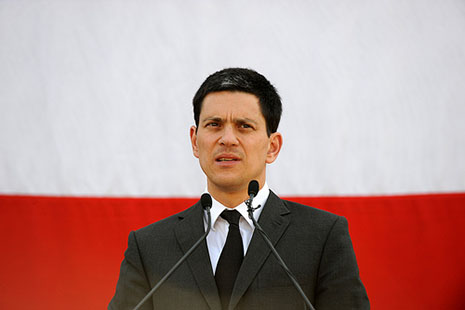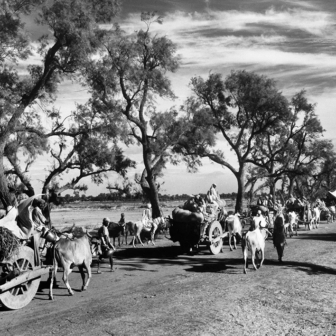“A NEW dawn has broken, has it not?” In fact, it’s hard to imagine a moment more remote from the sense of possibility that Tony Blair so typically captured following his election victory in 1997. It’s not just that an English victory in the Soccer World Cup seems as unlikely as ever. It’s probably not even the continuing threat to the financial stability of Europe, or the savage cuts to public spending announced by the new chancellor, George Osborne, in his emergency budget this week.
Rather, it’s the failure of the change of government in Britain to express some broader shift in cultural or political meaning. Whatever doubts might have been entertained in 1997 about the New Labour project and its beaming public face, however ambivalent Blair himself might have been about the Thatcherite legacy to which he was ostensibly opposed, it was impossible to overlook the significance of an electoral landslide that brought to an end eighteen years of Tory rule.
There was certainly plenty of drama in the days after the 2010 election, as the parties negotiated over the future government of Britain in a manner with which the country’s political elite was completely unfamiliar. Few doubted that David Cameron would become prime minister but the coalition agreement between the Conservatives and Liberal Democrats came as something of a surprise.
In retrospect, it’s hard to see why. It’s true that, ideologically, they seemed to have little in common. The political historian, Ross McKibbin, writing recently in the London Review of Books, was surely making a serious point when he suggested that – once you begin looking over policy areas such as immigration, crime, the electoral system, foreign policy and defence – a coalition government between the Conservatives and Labour would have made more sense than that between the Tories and Liberal Democrats. That such a possibility was not seriously entertained possibly tells us more about the adversarial culture of Westminster politics than about ideological cleavages in modern Britain.
The critical point is surely that the differences between the three largest parties in Westminster were not so stark as to prevent a bargain between two of them. Particular issues – the Tory desire to repeal the Human Rights Act and take Britain out of some EU treaties, the Liberal Democrat hostility to the renewal of the Trident missile system and higher university fees – can be put aside for the time being. Indeed, we are even beginning to hear about “Coalition chic” and the suggestion that, like New Labour’s association with Islington, Britpop and sundried tomatoes with polenta, the new government has an identifiable cultural style or aura.
In one sense, you’d imagine that the country’s new leadership wouldn’t have too many problems in this respect. Leaving aside for a moment the fact that both men favour “five-button cuffs” on their suits – apparently also associated with Prince Charles and Tony Blair – diversity at the top of government in Britain is now represented by a prime minister and his deputy whose fathers were, respectively, a stockbroker and a banker. Both were educated in what the British call “public” – by which they mean “private” – schools. David Cameron later went on to Oxford, Nick Clegg to Cambridge. Each is a white male in his early forties, married to a well-educated and glamorous woman who has balanced high-powered professional employment with child-bearing.
To this extent, and if such points of similarity truly matter, we have the makings of a cohesive Lib–Con political elite. But leaders are not whole parties, and they can never fully embody their traditions, still less their aspirations. In this sense, to look for a “style” in such a scratch team, or to imagine that a single individual is capable of practising a symbolic politics that can stand in for a whole political party, seems rather a waste of effort.
ON THIS POINT, I recently attended an Arts and Humanities Council–funded seminar in my own college, Uses of the Past, which looked at the ways in which tradition is deployed in contemporary British politics. Most speakers found it difficult to discuss the new coalition in the context of “tradition.” Emily Robinson, a scholar based at Goldsmiths University of London, pointed out that there had been virtually no resort to history in efforts to rationalise the new Lib–Con coalition. Instead, there has been a stress on its novelty. As she and others pointed out, there are surely good reasons for this approach, including the fact that every past coalition in British politics resulted in either the absorption of the smaller party into the larger or its obliteration. Any resort to history would, for the Liberal Democrats, be a frightening reminder of just how much they have to lose by their participation in a coalition government with the Tories.
Traditions, of course, are mobilised around communities. They express, as they seek to strengthen, a sense of belonging, based on a shared history, a common set of goals – however broadly defined – and a more or less agreed vision of what a good society would be like. Their function is to foster adhesion to a collective or organisation whose survival would otherwise be precarious. They are ultimately communities of memory.
There can be no Lib–Conservative tradition partly because there is no Lib–Conservative community. Nor is it in the interests of either party to foster a sense of common belonging. The coalition is a marriage of convenience and, like all such arrangements, will last only as long as the interests of the partners dictate.
That said, there are far more dangers in the marriage for the Liberal Democrats than there are for the Conservatives. The Tories, unlike the Lib-Dems, have a very large and solid core of voters that they’ll keep whatever happens over the next few years, just as Labour has continued to command mass support despite its poor recent standing. And under current constitutional arrangements, the Tories could decide to take advantage of a temporary surge in the polls to call an early election and rid themselves of an unwelcome encumbrance. This is unlikely to happen in the immediate future because there would be a political price to be paid for calling another election when it is clearly unnecessary and the coalition commands overwhelming public support, and also because it suits David Cameron to have an ally in Clegg for the time being.
The Liberal Democrats have been useful to Cameron not only in providing a necessary stepping-stone to Number 10 but also in allowing him – at least for the moment – to marginalise the most feral elements on the Tory right. Admittedly, his effort to tame the 1922 Committee of Tory backbenchers by changing its rules to allow ministers to join provoked an angry internal revolt. As a forum for backbench Tories to meet in private and air their grievances, it has inconvenienced many a Tory leader. In the end, there was a compromise between Cameron and the rebels, but the episode looked like a ham-fisted effort to muzzle potential opposition to the compromises that might be required by coalition. Some Conservatives apparently blame Cameron for the party’s failure to win a majority at the election; and their grumbling is likely to become louder under the pressure of events.
If the coalition has helped Cameron in dealing with his right, it has also been useful to Clegg. He can assure the fabled sandal-wearing left of his own party that joining the coalition gives the Liberal Democrats the opportunity to steer the Tories away from Thatcherite policy as well as achieve an enduring political and electoral transformation – notably a reformed electoral system – that will transcend the deep patterns of modern British political history.
There is much that is “Blairite” about the new coalition and in its aspiration to produce a “new politics” – one that will overcome the burden of the past – it is surely following in New Labour’s footsteps. All the same, unlike the coalition leadership and its backers, New Labour did talk a great deal about history, a point that comes through very well in Andrew Rawnsley’s excellent recent account of New Labour since 2001, The End of the Party. Blair, Brown, Mandelson, Darling – all of them were wrestling with the past, and especially Labour’s past, in their efforts to deal with the present and the future. All the same, as Fabian Society general secretary Sunder Katwala remarked at the Uses of the Past seminar, “the Labour Party has a problem with history.” He pointed out, for instance, that there was virtually no commemoration of the party’s centenary in 2000. It was as if the Blairites had declared their own Year Zero and wished to avoid drawing attention to the inauguration of a century in which Labour lost much more often than it won. Labour history was a dragon that only Blair and New Labour could slay.
Now, of course, Labour can hardly avoid talking about its history and traditions. David Miliband, former foreign secretary and the bookies’ favourite for the Labour leadership, is even saying that Labour needs to become a “movement” again. “I think the era of top-down command and control are dead,” he has declared. “Now is the time to rebuild and renew the Labour Party from the bottom up.” This might be considered a little cheeky coming from a Blairite who’s spent his entire career as a practitioner of the top-down politics that came to define the New Labour project.
As it happens, the next Labour leader is very likely both to be a Miliband and to bear a superficial resemblance to the two forty-somethings at the helm of the present coalition. Four of the five contenders are white men in their early forties – two of them brothers – and all five are products of Oxbridge. Andy Burnham, however, had a working-class upbringing and Diane Abbott breaks the mould even more drastically in being both female and black.
A more pressing question, however, than where the Labour leader went to university is what Labour will stand for. Gordon Brown’s strategy of using the proceeds of a massively expanding financial sector to fund social policy allowed New Labour to postpone indefinitely the question of dealing with inequality. Instead, as Maurice Glasman of London Metropolitan University remarked at the Uses of the Past seminar, New Labour opted for a stress on “fairness,” a vacuous goal that closed off instead of opening up possibilities for Labour in government. In a world supposedly governed by fairness, the present is simply superior to the (unfair) past, and tradition an obstacle to social justice rather than a guide to its achievement. I was reminded of Tony Blair’s remark, reported by Andrew Rawnsley, at the conclusion of a pre-war briefing by a Middle East expert on religious and ethnic divisions in Iraq: “That’s all history, Mike. This is about the future.”
In any case, now that hitching the polity to the wagon of finance capital is no longer a viable strategy for a British government, all parties are forced to rethink some of their basic assumptions. In doing so, it will often seem that the past offers little guidance about what to do in the present, and even less about how to make a future.
But the coalition’s Year Zero won’t last long; fundamental disagreements over issues such as Europe, education, civil liberties and electoral reform will soon test its unity to the full. And that’s only if the tricky business of how to cut a massive deficit does not bring it to grief in the meantime.
So far, things are holding together. The government’s budget, announced on Tuesday, will allow Nick Clegg to argue to his party, in parliament and beyond, that Liberal Democrat influence within the coalition has been a force for... fairness. It’s expected that 880,000 of the lowest-paid workers in Britain will now pay no income tax at all, which to a large extent delivers on a Liberal Democrat manifesto promise. Poor families will receive a higher Child Tax Credit. The state pension will be linked to earnings, thereby assisting economically vulnerable retirees. Banks and building societies will have to pay a levy expected to yield £2 billion. Local authorities will receive incentives to keep increases in the deeply regressive council tax as low as possible.
But there are also plenty of nasties. The rise in the rate of the Value Added Tax from 17.5 to 20 per cent will be unpopular. Jon Snow, the Channel 4 news presenter, gave Liberal Democrat Business Secretary Vince Cable a mauling on this subject, pointing out that dire warnings about likely VAT increases under a Tory government had featured in Lib Dem election advertising. Public sector salaries, meanwhile, are frozen for two years for anyone earning above £21,000; but in Britain, earning £22,000 or even £32,000 hardly makes you champagne-and-caviar type. Large projected cuts to the spending of government departments also make a mockery of suggestions that economies can be made without affecting frontline services.
“This is a progressive Budget,” claimed George Osborne. It seems that everyone is progressive these days, especially Tories who want to remind us that they’re not Thatcherites or help us forget they once went to Eton or belonged to the Bullingdon Club at Oxford. But as Maurice Glasman commented at Uses of the Past, the very last thing a patient wants to be told by her doctor is that the disease is “progressive.” •




